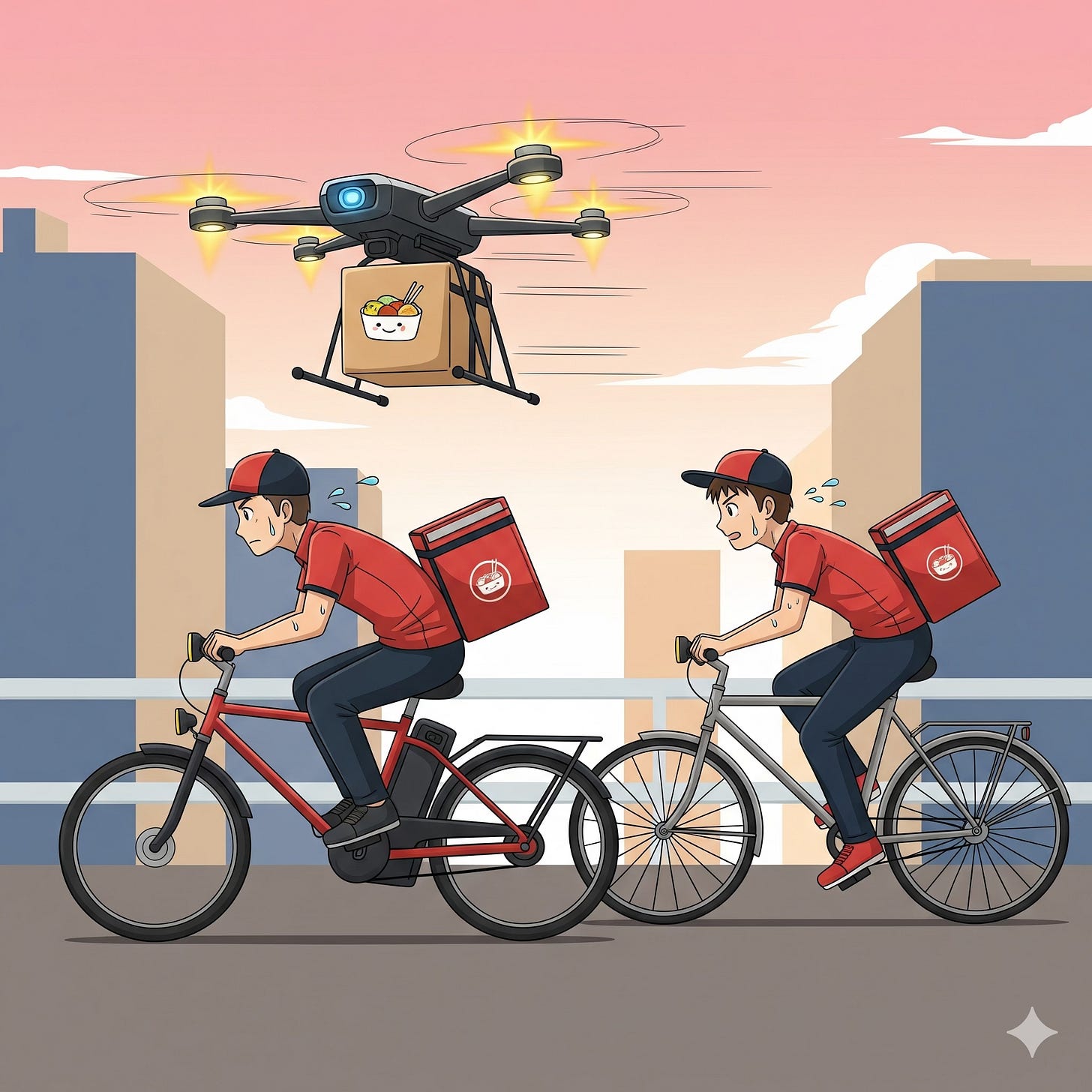How AI has shifted where I use my brainpower
I don’t send emails without AI anymore. And it’s… a good thing?
I’ve been using AI more at work lately. A lot. I don’t send any emails without consulting it anymore. While it has increased my output, it’s also reduced my brainwork. It’s a bit of a scary thought. But in this post I will argue why that’s mostly a good thing.
The key points, for those who love a summary to know if it’s worth reading more:
I’m paid to bring in results, not win literary competitions. AI helps me do my tasks better and faster. It makes all the business sense to use it
as leverage in my job shifts elsewhere, AI has just reallocated my brainpower to a different area of my job
From a business POV: I need to use AI
Let’s get straight to business. I have an email job. I’m paid to send emails that bring in results. If AI improves the outcomes of my emails, I have to use it. That’s really it tbh.
I used to be very good at crafting emails written entirely by me. From thinking about what I want from the email, to going over all the different scenarios I need to prepare for, to doing all the research (internal and external), to writing and editing the email, and then following up.
Yet now that I have AI help me do it in less time and achieve better results, I can’t rawdog the above anymore. It’s a shame, but I’ll get over it. I’m paid to drive results, not win literary competitions.
And I get it. Worst-case scenario, the above work can take 2h for just one touchpoint in one deal. Traditionally, if you worked on a few but large deals, this wasn’t a huge problem. Sending emails that move deals forward and bring in money is a high-leverage task. The brainwork is required and justified when it brings results.
But, now that we have “PhD-level companions” that can do a better job and faster? Relying solely on brainpower for 2h for a single touchpoint is no longer justified.
The introduction of electric bikes for food deliveries was likely a sad moment for those who delivered with a regular bike to “get in a workout and get paid while doing so”.
But just as you needed to get an electric bike to keep up and stay competitive, I need to do the same with AI.
This doesn’t mean I don’t use my brain anymore. It’s just that both my brainpower and the leverage in my day-to-day tasks have shifted and reallocated elsewhere.
Where leverage used to exist
A lot of work goes behind the scenes to craft emails that move deals forward, help the leads, and make my company money:
research on the company, the industry and niche, typical use cases, typical problems they’re looking to fix, etc.
research on the lead, on their job title, usual responsibilities, KPIs, pressure from other stakeholders, etc.
know everything about the industry, competitors, benefits, downsides, etc.
know everything about my product, what’s worked well in the past, case studies, problem statements, technical and legal implications, etc.
All while communicating effectively and using my sales experience to unblock things. There’s always a deeper layer. There was more leverage before when the difference relied on the salesperson. Most of the leverage was being competent, effective, experienced, and organized enough to do all the above in a timely manner.
AI can do all of the above now. Either entirely, or as a supporting role.
I could have Tour de France level of fitness on a bicycle, yet the guy using an electric one will complete his deliveries faster and make more of them.
How has AI changed my job
So AI can research accounts and prospects. It can have all the differences between competitors in a file. It can know everything there is to know from the legal and technical side of my software. Heck, it even knows my communication style because I’ve broken it down and fed it to the tool.
The goal hasn’t changed. It’s still to send emails that move deals forward. So, where’s the leverage? Where is my brainpower being used?
Well, it’s still being used in research. It’s still being used in figuring out the best use cases or common problems for each lead. Still being used in every single email I send. My job still mainly consists of the same set of tasks. Most just take less time to complete. All now require an extra level or two deeper than I was reaching before.
I’ll share a specific example.
Before using AI, my account research would vary depending on how easy it was to find things from a few quick searches. I had to deal with hypotheses. I had to make connections and ties to problems we’ve helped with in the past. I had to make assumptions.
Researching with AI has unlocked things I never could have done before due to time constraints: I can have the AI do an actual deep research on the company. Meaning, strategy notes in financial statements, quotes made by the CEO on the vision they have for the year, podcast appearances where they mention something relevant, Trustpilot negative reviews, news articles that mentioned a data breach, etc.
My emails before AI had questions and assumptions. They worked quite well when people would open up. Not everyone would, though.
My emails after AI still have questions. But they also have links to a quote their CEO made in an interview on their vision for 2025 and why. In my email, I propose a way they can present our project internally, aligning with said vision to make their lives easier.
It still depends on whether people will open up or not. But with AI, they seem to open up more.
Where is the leverage now?
As mentioned above, what I see is that AI levels the playing field and makes us all go a layer or two deeper. With AI, anyone can now send a decent email. There is still an edge in crafting the perfect email.
To go deeper, the leverage now lies in using our brainpower to think about the systems more often. A more meta approach to our job. Even as operators.
If I want the AI to write emails in my style, I need to think about my communication style, my strengths and weaknesses, how to break everything down into actionable chunks, and how to continue improving.
If I want the AI to think like the best software salesperson so it can analyze patterns, I need to know which resources to feed it, which ones to avoid, how to package all of this, and what makes sense for the software and industry I sell.
If I want the AI to know everything about my software, the industry, case studies, problem statements, business cases, etc. I need to find a way to get all that data and make it useful.
If I want my AI systems to improve, I need to continuously think about feedback, cleaning data, obsessing over my processes, and continue to seek for an edge.
And, one day, all of this might be solved and automated. And I will have to use my brainpower elsewhere.
We will be racing down the streets on our electric bikes to complete deliveries, and one day, self-guided drones will be completing deliveries for us, and we will have to focus on something else.



